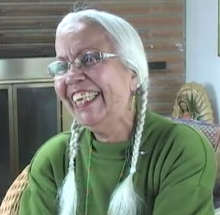
Alicia Escalante was born in El Paso Texas, in 1933 to what she describes as a traditional family. She was the second oldest of seven children, and she shared an intense bond with her mother. After 15 years of marriage, Escalante’s mother decided to divorce her father due to his infidelity, alcoholism and abuse. At the divorce court proceedings, her father was granted custody of all seven children, because of her mother’s lack of employment and housing. After the divorce, Escalante’s mother moved to Los Angeles to live with her sister and find work in hopes that she might be able to regain custody of her children. Devastated to be separated from her mother, and miserable with “the oppressive situation” of living with her father’s extended family (who frequently blamed her mother for the divorce), Alicia Escalante vowed to be reunited with her mother at any cost., At the age of nine, Escalante jumped into an open freight car of the train that ran behind her house. She was determined to make it to California by any means necessary.After the police discovered her, her father allowed her to continue on her journey to California, where her legacy would begin.
As Alicia entered adulthood and began to forge a life for herself, it became very clear that there were many inequalities that surrounded her. A single mother of five, she was swallowed by poverty and thus began to recognize the Welfare system as punitive and oppressive. Alicia felt that the women forced to seek services were never treated with any dignity or respect. This would drive her to become involved with the Chicano Movement and eventually to create the East LA Welfare Rights Organization in 1967. She was able to get the organization started with the assistance of her family practitioner, Doctor Carlo. He set her up with an office and phone where she was able to begin mobilizing the community on welfare rights issues surrounding medical and services cuts. Alicia was concerned about the mistreatment of women, specifically Blacks and Latinas, who found themselves on welfare “through no fault of their own.”
As part of the Welfare Rights Movement and Chicano Movement she became very close with leaders like Corky Gonzalez and Gloria Arellanes. After political and legal persecution as a result of her activism, Escalante spent some time in Denver teaching Spanish and Welfare rights at Corky Gonzales’ Escuela Tlatelolco. She was also involved with protesting police brutality, the Vietnam War and researching world hunger.
Escalante’s Chicana Welfare Rights Organization provided community workshops on welfare policies and rights, translated welfare forms for Spanish speaking families, aided people in applying for aid and grievances, and even opened a café to help feed the community while training welfare women for work. She also worked to create a bilingual newspaper through her organization, La Causa De Los Pobres. Alicia began to realize her writing could be used to mobilize and empower people to enact change. Although her newspaper was short lived, she wrote many articles for various news outlets including Encuentro Femenil and La Raza Newspaper.
Alicia worked to transform Welfare policies on a state and national level, even participating in the Poor People’s Campaign march on Washington. She was also involved in policy change around the sterilization of women of color and in shaping early Chicana feminist thought during the Chicana Movement. After moving to Sacramento California, Alicia continued to advocate for underrepresented women and youth as a Social Worker.
